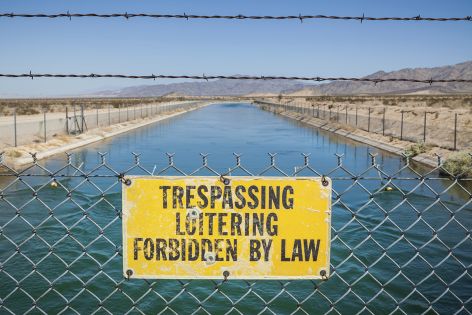Water Wars!
Water is essential for farming, industry and life itself. When there is drought or scarcity, water can spark conflict. Are water wars ahead?

“Conflicts take many forms, including tensions over allocation of water, attacks on water systems in conflicts that start for other reasons, the use of water and water systems during conflicts, terrorism, and development disputes,” says Pacific Institute’s president, Peter Gleick.
Sources of water conflict
Typically, the conflict involves a body of water that is not owned by a single nation or state, but flows from one nation to another and must be shared. Disputes happen when one nation builds a reservoir, irrigation network or dam to divert water away from another nation.
There are 276 lakes and rivers in the world that either mark or cross international boundaries, according to Zafar Adeel, director of the United Nations University Institute for Water, Environment and Health and former chair of UN Water. Less than half of these rivers and lakes are covered by treaties, and many are sources of conflict.
Disputes happen when one nation builds a reservoir, irrigation network or dam to divert water away from another nation.
Political tensions over water
The majority of the water disputes materialize in the form of political tensions. For instance, the United States is upset with Mexico for draining the Rio Grande, and Mexico accuses the U.S. of using more than its share of the Colorado River.
And in the Middle East, Abu Zeid, Arab Water Council president, said that the attempts of the self-proclaimed Islamic State “to control Arab water resources would lead to a water crisis that would overshadow the ongoing oil conflict, since water is a matter of life or death” (“How IS Uses Water as a Weapon of War”).
This could expand the conflict between ISIS and other Middle East nations and result in full-scale war. This would not be the first time modern wars have been fought in the Middle East due to conflicts over water. Many argue that the Six-Day War in 1967 stemmed from the Arab League’s plan to divert the Jordan River, Israel’s primary source of freshwater. Recently, Egypt has threatened military action against Ethiopia for building a dam on the Nile River.
Growing risks
Gleick believes that as competition for freshwater sources increases, the risks of water-related conflicts will grow.
“Perhaps not between countries, where we have pretty well-developed mechanisms of diplomacy and negotiation that we use to reduce the risks of conflict,” he says. “But we’re seeing more evidence of subnational disputes and conflicts—conflicts between farmers and cities, between ethnic groups, between pastoralists and farmers in Africa, between upstream users and downstream users on the same river.” He adds, “Rather than India versus Pakistan, it’s Karnataka versus Tamil Nadu over the allocation of a river that is shared between those two states.”
Possible prophetic implications of water wars
Jesus Christ prophesied that in the times leading up to His return, “Nation will rise against nation, and kingdom against kingdom” (Matthew 24:7). The Greek word for nation is ethnos, which can mean either formal nation states or tribal peoples. Conflicts over water have been the causes of warfare for thousands of years and may become a factor in the conflicts in the end times.
For more about the global water crisis, see the July/August 2015 Discern articles “Water Crisis” and “Water in Bible Prophecy.”
Date Posted: May 20, 2015

